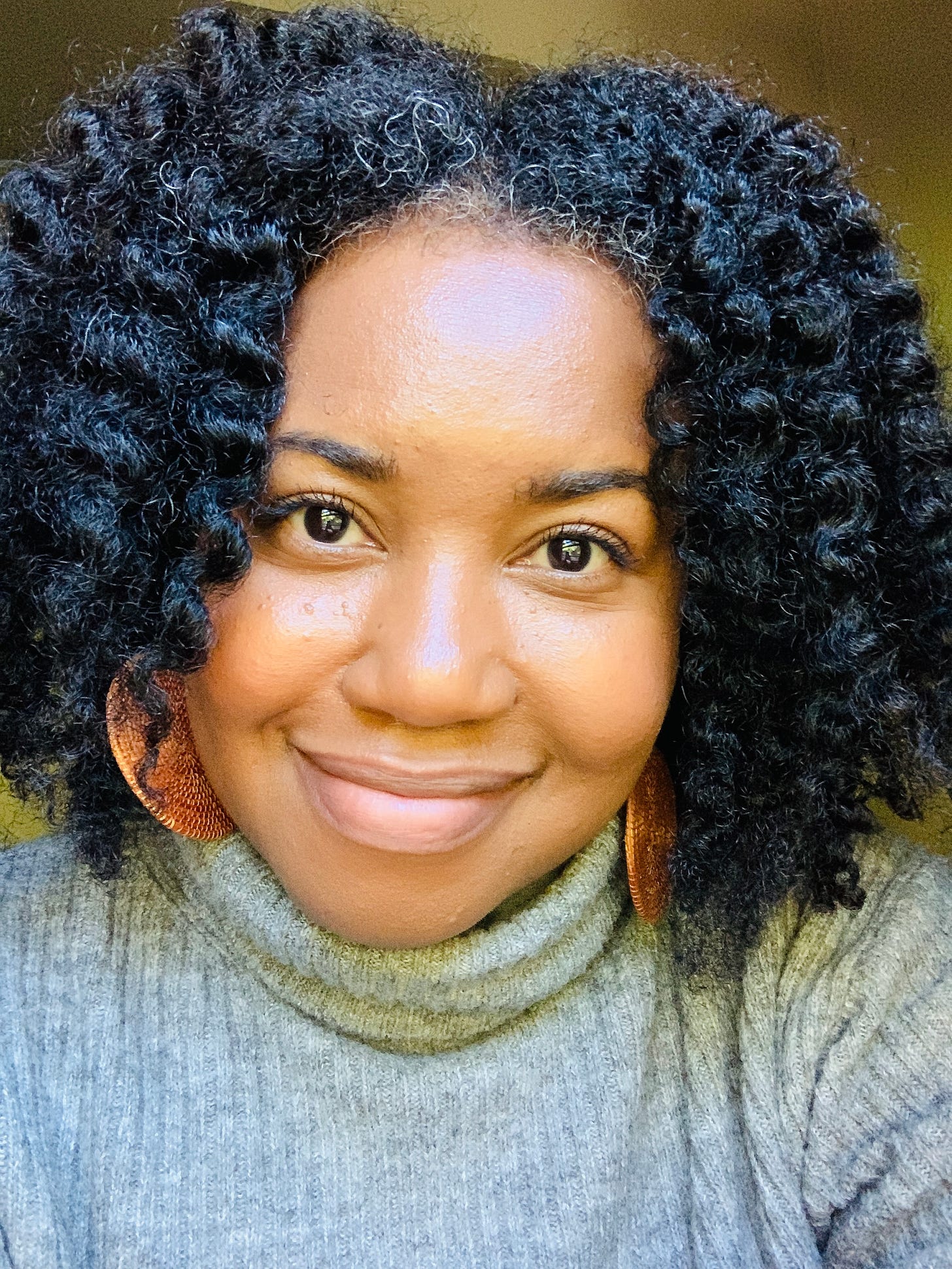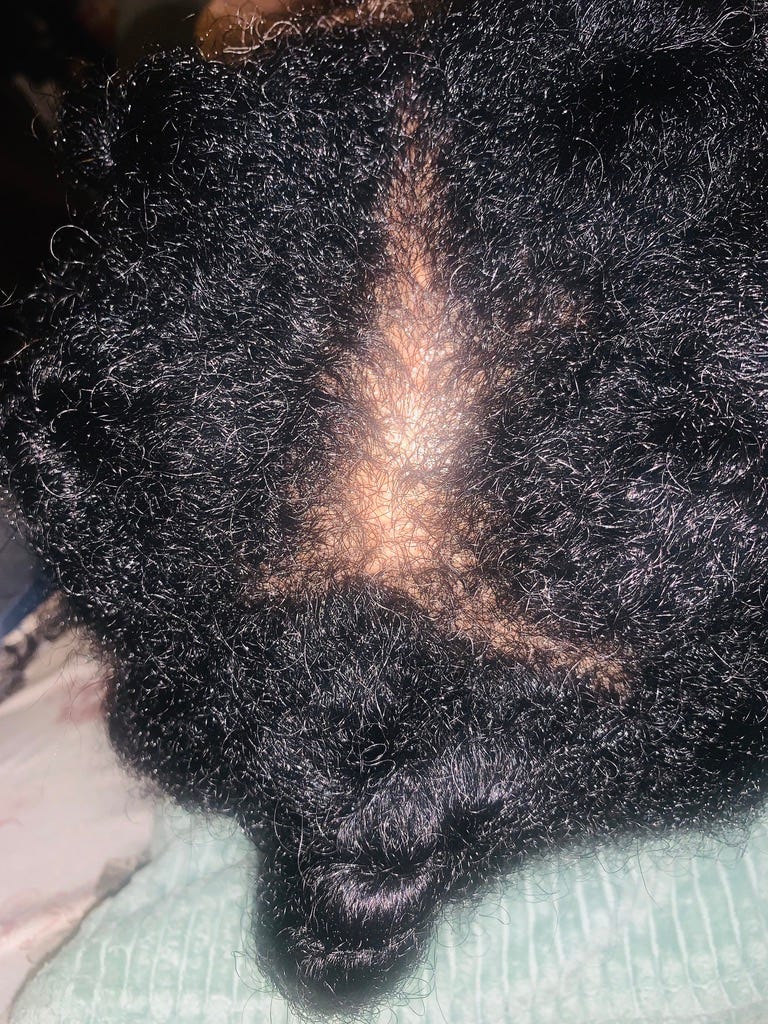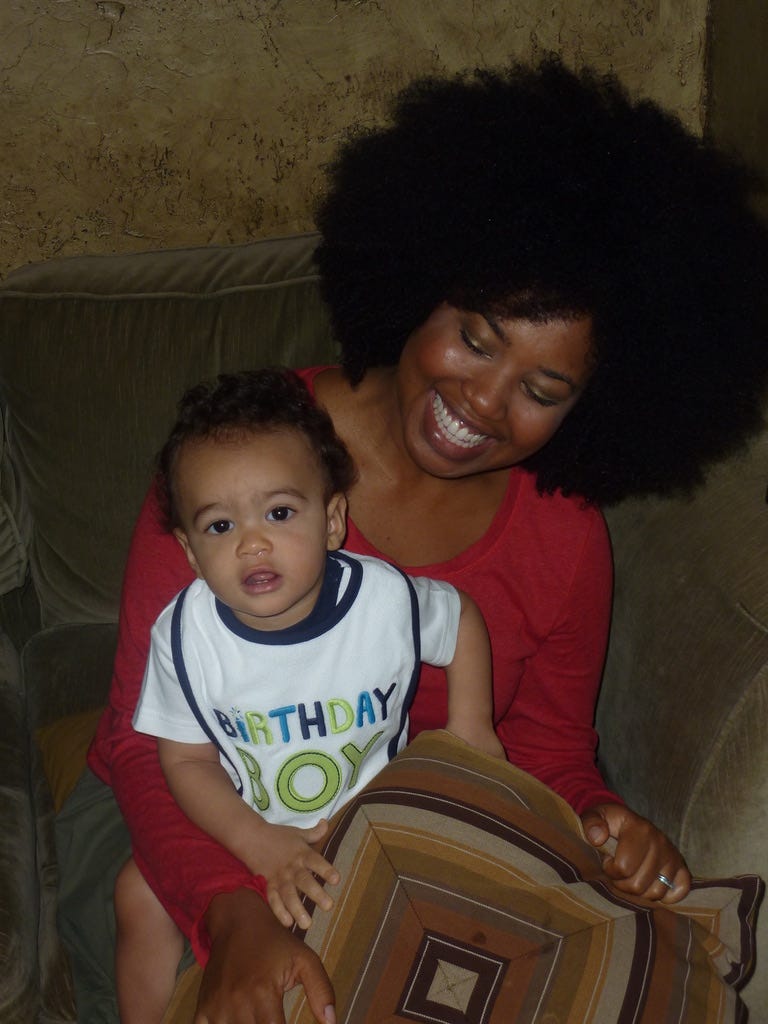Hair loss is giving me an identity crisis I didn’t see coming.
I am losing my hair. I haven’t been able to write lately…but you know what? Imma just write about this.
I am trapped among emotions: grieving the loss of the only self I have ever known, cursing menopause, shaming myself for—what? vanity?—not being appropriately pious, and feverishly desiring to heal myself someway, somehow. I scour the internet and find condescending lectures on Black women and traction alopecia (which I don’t have) and why it’s so horrible “what we do to ourselves” (never mind the fact that we have to legislate the right to wear our hair naturally; never mind the beauty standards that exclude us; never mind the hair products sold and marketed to us that are literally poison). I join all the Reddit hair loss topics, which is hit or miss. I find us on YouTube, talking about our hair loss journeys, and using everything we can—diet, herbs, tinctures, minoxidil, prayer—to get our crowns back. I am so thankful to every sister who makes public her private pain and loss in order to help someone else. In order to help people like me.
Their courage is buoys me to make my plight plain. For any Black woman struggling with hair loss (and apparently for 50% of us, this will be a reality), you are not alone. You’re not alone in the tears and shock. You’re not alone as you cry in the shower as you wash your hair or examine your scalp in the mirror. You’re not alone in spinning in the vicious circle of trying to reduce your stress and then getting stressed about being stressed.
I have always been identified by my hair, first. Hair loss (and perimenopause, but that’s a whole other post!) has forced me to examine what I lean on as my identity. And I definitely lean on my hair as a symbol of my femininity, vitality, and expression. The first thing my dad saw as my mom was giving birth to me was a soft cloud of raven curls. My hair is the first thing that attracted my husband. When I was pregnant with my boys, my hair heralded their presence by forming a fabulous halo on my head. Post-partum took my edges, but mostly gave them back. Hair loss is giving me an identity crisis I didn’t see coming. I need to bury the dream I have always had of a snow-white crown. I can no longer picture what I will look like, should I be graced with the fullness of years. I mourn this.
This post is not a how-to for hair regrowth: I don’t have a cure, I am not a medical professional and I was just diagnosed 3 weeks ago (androgenetic alopecia…and an upcoming biopsy will diagnose more). But I am writing for other Black women who are searching for community in their sadness and shock. I will share what I understand so far. I won’t talk about traction alopecia because we have so many online lectures about tight braids, weaves, harsh chemical treatments and the like. If you have knowledge to share, feel free to do so in the comments!
For any Black woman struggling with hair loss (and apparently for 50% of us, this will be a reality), you are not alone. You’re not alone in the tears and shock. You’re not alone as you cry in the shower as you wash your hair or examine your scalp in the mirror.
Google is not your friend. It’s at most a trifling acquaintance. After rabid googling, I diagnosed myself with every kind of alopecia and went to bed with a sense of doom every night. I cried myself to sleep many a night as well. Like the frenemy Google is, when she wasn’t terrorizing me with false diagnoses, she was giving me a vocabulary on hair loss that I didn’t previously have. It’s a mixed bag. Don’t be like me: limit your search time and don’t search before bed. Stress and worry won’t help your body in any way at all.
You need to see a doctor who will listen to you. You are an expert in your own body. Don’t doubt yourself: if something feels off, get yourself checked out. As far as you are able, do not tolerate a dismissive healthcare professional. Ideally, you can be seen by a dermatologist who specializes in hair, but a general practitioner should be able to help you investigate your hormone levels via blood work and refer you to a specialist. Androgenetic alopecia is linked to dihydrotestosterone—a hormone that shrinks hair follicles and causes thinner and shorter hair, followed by baldness. If your hair loss is due to this hormone, your hair will not grow back without treatment.1
Inflammation is an issue. Okay, so inflammation — a cellular immune response to bacteria or tissue damage — is not inherently bad. But when we develop chronic inflammation, our body is attacking itself when there is no threat. Inflammation affects the scalp just as much as any other body part, but often, we can’t see it until our hair follicles fall victim. How we eat and drink can reduce inflammation (and honestly, these changes are great for the entire body). You already know this, but I will remind you anyway: a diet marked by hydration, dark leafy greens, good fats (oily fish, olive oil, avocados, walnuts), minimal sugar and minimal processing, will cause your body to function better and will reduce inflammation. Bonus if you consume less dairy and red meat. An don’t fry the foods, okay? Ginger, turmeric, and garlic combat inflammation, and supplements like fish oil and vitamins A, C, D and zinc boost our immune system health as well.
Stress is an issue. Sister, rest is a must. Hair loss can be exacerbated by stress. I know that once I say, “don’t stress,” it’s impossible to not start stressing about stress. I’m sorry. I get it. But it is imperative that part of our resistance as we traverse this raggedy world include rhythms of rest, meditation, reflection, prayer, and stillness. We literally cannot afford to push our health to the back burner.
Genetics can be an issue. I got my balding from my mom and dad. For a lot of us, hair loss is an inheritance. Sigh. But what’s fascinating is that just because you have the genetic predisposition doesn’t mean you will lose hair. Diet and stress reduction can keep hair loss at bay for some of us.
Minoxidil and/or Propecia are lifer drugs. There are some forms of alopecia that respond to minoxidil. There are some that don’t. I don’t know how effective minoxidil is — when I picked up my prescription at Costco, the pharmacist who had to give me a consult said, “this is a waste of time and doesn’t really work for anybody. Just get a hair transplant” (a delightful response during an achingly vulnerable time). You can get topical minoxidil over the counter at Costco, Target, Walmart — it’s widely available. There’s also oral minoxidil. This treatment can cause heart problems, sexual dysfunction and excessive hair growth in other parts of the body, which is particularly concerning because minoxidil is a lifer drug—it treats the chronic condition of hair loss, so when you stop taking it, hair loss returns. Same with finasteride, whose brand name is Propecia. Finasteride inhibits androgens (remember the DHT I talked about earlier?) that shrink hair follicles. This drug can also cause sexual dysfunction in men, but of course, there aren’t nearly as many studies for the effects on women. It seems that women are able to better tolerate both minoxidil and finasteride, though. I’ll keep you posted (honestly, I can see baby hairs on the parts of my hairline that are balding, but maybe I am just being uncharacteristically optimistic).2
This hair loss journey has been an unintentional opportunity to speak life to myself. I prayed for help in quelling my inner critic, who is quite loud, loquacious, and harmful, and instead turning up the volume on my inner consoler. It’s been a practice to look in the mirror and remind myself that I am so blessed and deeply loved, that my grief is valid because my hair is a part of me and my body is changing in disconcerting ways, and that my body has faithfully taken me through so much and has cared for me even when I neglected her. I get to pioneer this new era in my own loveliness. I get to care for myself and give thanks that I am aware of when I am ill.
If you are on the hair loss journey, you are not alone. Lift your chin. Let’s hold hands and walk this through together.
If you’re like me and perimenopausal, then, babaaay, hang on tight. The United States medical field has an embarrassing lack of research, study, or resources when it comes to middle-aged women in general, and Black women in particular. Just when we need help with the seismic hormonal shifts happening within us, there’s just…next to nothing. There is Hormonal Replacement Therapy (HRT), but many of us are scared of the cancer risks associated with estrogen supplementation. And many practitioners are uninformed about perimenopause and don’t offer perimenopausal women any options, much less HRT. Sexism shows up in the wealth of cosmetic surgical options for women (procedures that makes us look younger but don’t help our bodies adapt to changes) and the paucity of interventions for hormonal shifts brought on by perimenopause. “It’s just what happens,” is basically the explanation for significant hair loss, skin thinning, breast changes, fatigue, dry skin, “vaginal atrophy” (their description, not mine — and no, there’s no “penile atrophy” descriptor), vision changes, and brain fog. Oop, here I go back on the perimenopause subject. Sorry. See a doctor. I have read that early intervention in hair loss leads to better outcomes. So don’t delay if you can help it.
Speaking of drugs that we can tolerate, there’s also a drug called spironolactone that often helps women — especially non-menopausal ones — to regrow hair by blocking androgen hormones (reproductive hormones that in excess in people assigned female at birth can cause Polycystic Ovary Syndrome, extreme acne, *male* pattern baldness, weight gain, and hirsutism). Spironolactone is used in conjunction with other hair growth meds. It can cause birth defects so it’s strongly NOT recommended for people who could get pregnant.








Thank you for your honesty and for being you. You are so much more than your hair, and yet I mourn with you the loss of ANYTHING when you’ve already endured so much. These bodies care for us and also betray us, and it is so hard. Prayers as you journey through the figuring-it-out it seems we do over and over, I’m right there too (with different issues). Always grateful I get to be in a world where Sharifa writes.
I saw the title of this post on my way to work this morning and took a deep breath. I knew I needed to be seated in my body to read and be present with your story and I am so glad I waited...and waded with you. Thank you for your vulnerability...its yours to give as you wish, and in making the choice to share this, I hope so many Black women are liberated. You are beautiful and your hair is just one of the many crowns that you wear. 🖤